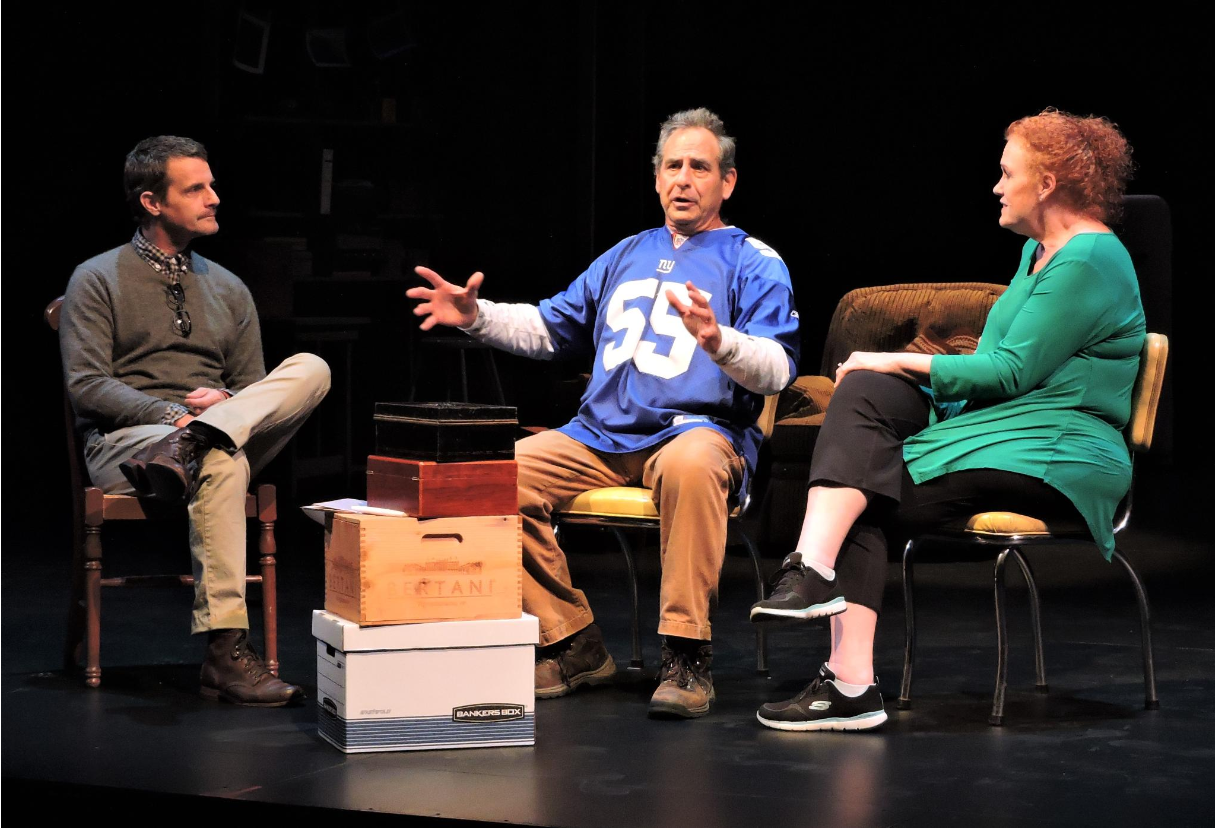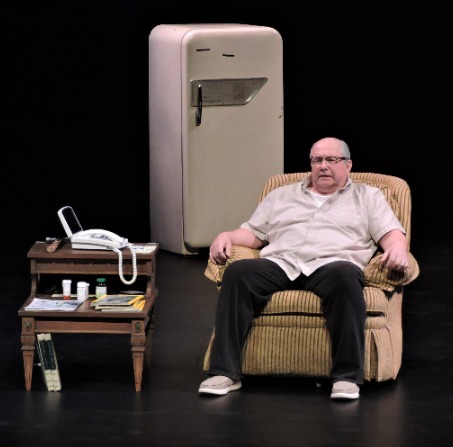Great Barrington Public Theatre
Dad by Mark St. Germain.
Directed by Jim Frangione. Reviewed by J. Peter Bergman.
"Number five: I have great kids."
There is nothing so difficult as our relationships with our parents. Even as adults, successful adults in particular, that older generation just continues to make our lives hell. For Mark St. Germain his father is the most difficult person he knows. That is Mark St. Germain, the character in Mark St. Germain's new play, "Dad," having its world premiere production at Great Barrington Public Theater's summer space in the Daniel Arts Center of Bard College at Simon's Rock in the town of Great Barrington, MA. Directed by the company's Artistic Director Jim Frangione, who also took over the title role at the last moment, "DAD" is as much a play about the man's three mature children and about how they deal with him. Let me just say it's a challenge that at least two of the kids don't relish most of the time. He expresses his joy in one son but keeps Mark and their sister in a limbo space when it comes to emotional connection, to real pride and joy in their lives and accomplishments. Being good is never enough for Louis St. Germain. Being what Louis wanted them to be is the only way to garner support and neither of them have achieved that, especially not Mark. It's a real "Oy Vay" relationship.

Mark H. Dold as Mark, David Smilow as Paul, Peggy Pharr Wilson as Lynn;
Photo: Tristan Wilson
St. Germain had vowed never to write about his family, the pandemic year caused him to rethink that promise and this play is the result. As in many of his former plays about real people this family's members say and do things we don't expect and as they do the dynamics of the piece alter and continue to fascinate us. Mark makes every conceivable mistake that a son can make, at least in Louis's eyes, and even his sense of humor which makes his television writing a success does not please Louis. Dad prefers the sophomoric commentary coming from his son Paul. Their sister, Lynn, can use her "girly" charms to get around good old Dad for the most part, but he is only susceptible to her when he chooses to be. He is really a mean-spirited old duck and he plays off his kids as he chooses. Lynn is played by Peggy Pharr Wilson; Paul is David Smilow; Mark is played by Mark H. Dold. They are a terrific trio of actors who actually feel like siblings in this play, even stepping on each other's lines and actions. They feel perfectly right in their roles.

Mark H. Dold
T There are some things you have to question. For instance, does Mark St. Germain see himself as Mark H. Dold? The two have often worked together so they know one another well. They are not the same physical types at all and their lives have certainly not taken the same turns. Still, Dold seemed to become St. Germain for the length of the play (104 minutes). His verbal quirks and his body language were similar to the playwright's. His savage good looks became softer, rounder than usual. This was not a trick of makeup, by the way, but more an actor's metamorphosis. That leaves me wondering how close Pharr Wilson and Smilow might be in this play to the people they represent.
Smilow is excellent as Paul. He presents as a man with an agenda where his brother is concerned. He baits Mark; he pushes buttons not heretofore seen. He incites those nerves kept protected from harm and lights small fires in Mark's soul. He uses innate resentment to make points that are painful. The author has made his brother out to be one step beyond nasty but still loving from a distance.
Pharr Wilson's Lynn is 180 degree apart from Paul. She plays up the softness rather than the neediness that this girl in the family quartet might feel. She is the calm corner one can flee to when necessary. She can dissolve her own troubles and encourage her brothers to share their own. She is someone you like and forget to wonder about for she seems to be so deeply involved with you. She bridges the gaps between Paul and Mark, but even she cannot do the same for her brothers and their father.
Altogether this family unit is a neatly packaged pairing of the New Jersey sensibilities we've seen in 1950's films and plays. The St. Germains, including the unseen mother and others, is well placed in this particular play.

Jim Frangione
Jim Frangione, long an actor, has undertaken this stage role with only a few short days to prepare his interpretation. And for this trial by fire he can be awarded a verdict of No Guilt. He plays to role to perfection. Of course he came to the part of Dad after directing the play, so he could easily fall into the physical presentation with no trouble. It is the character itself that is remarkable. Dad's moods are changeable without warning, his ideas expressed in both the negative and positive without a flinch. His gestures, all his own, are partially mirrored in his son's movements. No matter what Dad feels about Mark's peculiar failures we can see that his best fatherhood efforts created a strange mirror effect in his offspring. In fact, Frangione is more like Louis than we might expect from his loud outbursts or his oddly comic reactions to even a simple thing like a toy dog's bark.
As the director of the play he has done a wonderful job of keeping the large space of the stage small. The play sets up from the outset with a photo of a home that could have been converted from an old-fashioned trailer-home. Using the stage horizontally, he helps to fasten that image on the observers. John Musali's set helps with the illusion though he makes it clear that we are in an older house and not in a room on wheels. Frangione has given Dad a dominant spot on the stage, and yet he is placed off-center which allows the three other actors opportunities to pull attention. Dressed simply and casually in consistent beige the director has given George Veale, the costume designer, a chance to bring more individual looks to the three younger folk. Brian Barnett has used the lighting to enhance this house's reality and the play's sense of time in that reality, casting the look of today and the feel of yesterday as needed without forcing harsh transitions.
Dad himself
Dad's refrigerator is filled with left-overs though no one can remember him eating an actual meal. His phone is a late-model land line. His television is small but satisfying. This is a man who asks for nothing, accepts very little and will not tolerate or even consider an update in the trappings of his daily life. He is a frustrating man whose kids, even the current favorite, Paul, cannot entirely please. He has permanent opinions, mostly self-created. He will not change. Still, he is a man with secrets packed away in boxes to be opened only upon the instance of his death. St. Germain, the playwright has kept some surprises for the finale of the play and they are exactly what we should expect. But, he can grab us by the sacred places and wrench a tear out of us for the climax of this play. This is just what I would expect from the man who often surprises me with unforeseen changes in a man's character: a bigot like a black woman, for example or two men with very different concepts of life become honest friends. This play does more, does it well, and leaves you wondering how maddening was Dad, after all.
+ 06/27/2021 +

Jim Frangione as "Dad"; Photo: Tristan Wilson
Dad continues through July3 at the Daniel Arts Center of Bard College at Simon's Rock in the town of Great Barrington, MA. For information and tickets go to their website at www.greatbarringtonpublictheater.org